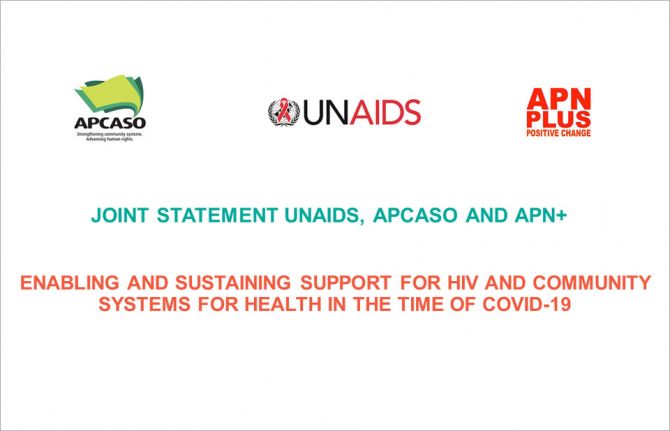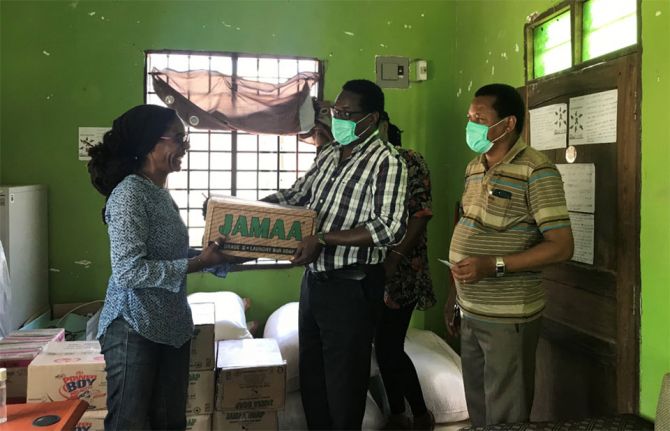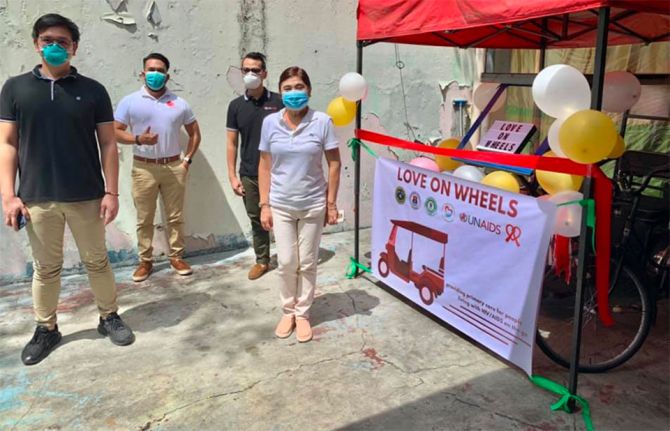
COVID-Blog
Pasig City signs Fast-Track Cities Initiative to scale-up the response to the HIV epidemic in the context of COVID-19
22 July 2020
22 July 2020 22 July 2020In the Philippines, the Mayor of Pasig City, Vico Sotto signed a declaration of commitment to implement the Fast-Track Cities Initiative (FTCI), which aims to scale-up the response to the growing HIV epidemic in the context of the COVID-19 pandemic.
Pasig City will proactively deliver quality services to everyone, including hard-to-reach populations, by increasing investments to scale-up HIV programs, establishing more treatment facilities and integrated social hygiene clinics, and training more healthcare providers to deliver HIV and COVID-19 services.
UNAIDS will provide technical support in the implementation of the strategy to ensure that efforts at the local level are strengthened to respond to COVID-19 and HIV, including scale up of testing and zero discrimination programmes for healthcare providers.
Learning from the HIV response, Pasig City is one of the cities that is providing COVID-19 testing to its residents, has introduced a loan program to revitalize the economy of small and medium enterprises, and established quarantine facilities providing food and medical care and other essential needs.
Region/country


COVID-Blog
UNAIDS launches a call centre for people living with HIV in Zimbabwe
20 July 2020
20 July 2020 20 July 2020As the COVID-19 pandemic scales across Zimbabwe, there were numerous calls from global partners, including the United Nations Secretary-General, for the expanded use of tele-health and innovative technology solutions to limit congestion in health care systems and the adverse effects of potential disruptions to health care caused by lockdowns.
In response to the call, UNAIDS provided guidelines and financial support for the procurement of equipment and the training of online counsellors from the Zimbabwe National Network of People Living with HIV (ZNNP+) to establish a call centre to respond to inquiries from people living with HIV across the country.
The call centre platform is a national surveillance and information system which will ensure that challenges faced by people living with HIV are captured in real time and HIV services to boost COVID-19 testing, isolation, contact tracing and treatment are deployed efficiently.
The call centre will cover Zimbabwe’s ten provinces and will track specific indicators integrated into a data store which will assist in collating and analysing data received from the sub-national levels.
The collected data will be used to inform advocacy for issues like multi-month dispensing of antiretroviral medicines, access to viral load testing and access to HIV prevention and management.
“We welcome this initiative as it is user-friendly; people are able to call for free and have their issues addressed,” says Tatenda Makoni, Executive Director of ZNNP+.
The platform will assist the national network of people living with HIV in being proactive to serve the needs of its constituency. The platform will not end with COVID-19 but will focus on HIV services to boost testing, contact tracing and treatment capacities in Zimbabwe. Lessons learned from the call centre will be used to inform replication in other sectors and regions.
Region/country
Related


COVID-Blog
UNAIDS supports communities during COVID-19 outbreak in Kenya
20 July 2020
20 July 2020 20 July 2020UNAIDS has embarked on a project to support communities in Kenya during the COVID-19 pandemic.
The project has a two-pronged approach to provide short-term, urgent assistance and long-term, structural interventions to empower communities to respond to the immediate and extended impacts of COVID-19.
It also seeks to strengthen advocacy efforts aimed at government and partners to include the needs of vulnerable communities, including people living with HIV, key populations, adolescent girls and young women and pregnant and breast-feeding women, in COVID-19 response plans.
In the short-term, UNAIDS, in partnership with The National Empowerment Network of People living with HIV/AIDS in Kenya (NEPHAK) and Women Fighting AIDS in Kenya (WOFAK), is distributing food and hygiene packs to people living with HIV in informal settlements.
WOFAK is distributing food vouchers across six counties in Kenya, targeting 450 women and girls in all their diversity. The two organizations are together distributing hygiene packs, consisting of a three-month supply of soap and disinfectant, as part of a partnership between UNAIDS and Reckitt Benckiser, to 10 000 people living with HIV across Kenya.
Furthermore, UNAIDS is supporting community organizations with a grant of Kes. 7 400 000 (USD 69 256). These funds will not only purchase food vouchers, but also will support communities to meaningfully engage in the Global Fund application process, assess the impact of COVID-19, including human rights and gender violations during the pandemic, and support civil society organizations to develop key messages and consolidate their strategies while linking them to Kenya’s Ministry of Health.
Region/country
Related

COVID-Blog
Income generating initiatives to support the needs of sex workers in Fiji
20 July 2020
20 July 2020 20 July 2020In Fiji, UNAIDS donated cleaning equipment and gardening tools to an income generating project initiated by Survival Advocacy Network Fiji (SAN Fiji) to support the needs of sex workers who are facing hardships during the COVID-19 pandemic including loss of income.
SAN Fiji, an advocacy organization for the rights of sex workers, has been working with other organizations such as Strumphet Alliance Network, Haus of Khameleon and UNAIDS to implement income generating initiatives for sex workers including catering, grass-cutting services and general backyard cleaning.
Region/country

COVID-Blog
UNAIDS supports food assistance project for key populations in Rwanda
10 July 2020
10 July 2020 10 July 2020In Rwanda, restricted movement during the COVID-19-related lockdown has affected population groups differently, particularly sex workers, members of the LGBTI community, and households that survive on a daily income.
The most common challenge faced by key populations during lockdown is lack of food, particularly among people living with HIV and sex workers, which is most likely to exacerbate vulnerability to new HIV infections as the need to survive becomes heightened.
As a result, a coalition of four civil society organizations from within the Rwanda NGO Forum on HIV and Health Promotion, in collaboration with the District of Gasabo, in Kigali, Rwanda, has launched a three-month project called Turikumwe (which means “we are together” in Kinyarwanda).
With catalytic funds from UNAIDS and financial support from the European Union, the project will provide food assistance and sanitary equipment to people most affected by the COVID-19 pandemic in selected districts in Rwanda. The food and goods will be distributed by the coalition, through their local associations, to communities of LGBTI people, sex workers and young mothers affected by the COVID-19 lockdown. The project will reach 2 000 vulnerable people.
“Supporting the efforts of civil society, in collaboration with the Government of Rwanda, to reach communities of LGBTI people, sex workers and young mothers, ensuring that no one is left behind, is a key milestone for UNAIDS,” said Andrew Gasozi Ntwali, Community Support Advisor at UNAIDS Country Office in Rwanda.


COVID-Blog
Joint statement by UNAIDS, APCASO and APN+ call for equitable systems for health in the context of COVID-19
02 July 2020
02 July 2020 02 July 2020In the context of the COVID-19 pandemic, UNAIDS, APCASO and APN+ issued a joint statement to emphasize the key role that the HIV response can play in developing and implementing equitable systems for health, including sustainable HIV and COVID-19 programming.
Vulnerable and marginalized people are often the most affected by COVID-19, physically, economically and socially. They are the least able to protect themselves, often living in crowded conditions without sufficient hygiene facilities or on the street. Due to restrictions imposed in response to COVID-19, women have faced increased rates of gender-based violence. Vulnerable and marginalized people are also the least likely to be able to access social protection measures designed to ensure access to basic food, hygiene and livelihood support.
The joint statement emphasizes that community-led responses must be a formally recognized element of any country’s responses to HIV and COVID-19. It also calls on governments and donors to ensure sufficient funding and political and legal support to networks of people living with HIV and key populations, community-based health services, and community and civil society service and advocacy organizations.


COVID-Blog
UNAIDS support to women who use drugs and their families in Tanzania to prevent COVID-19
30 June 2020
30 June 2020 30 June 2020In Dar es Salaam, Tanzania, the COVID-19 pandemic has amplified the struggle for those who are already marginalized and vulnerable. In densely populated areas and informal settlements, where many of the cities’ people who use drugs reside, social distancing is difficult and running water and sanitation infrastructure is sparse.
Many people who use drugs, especially women, make a living doing work in the informal sector, for example housework, sex work or informal trading. They are seeing their income reduce and life for them and their families becoming difficult.
Through the Tanzania Network for People who Use Drugs (TaNPUD), an umbrella for people who use and inject drugs with 11 partner organizations, UNAIDS is supporting people who inject drugs and recovering drug users and their families in 19 campsites, called “maskanies”, and one shelter in Dar es Salaam. TaNPUD, provides information and communication messages on COVID-19 and stigma and discrimination, basic hygiene supplies (buckets, soap and sanitizer) and basic food rations to last approximately one month for each family. The project is financially supported by UNAIDS.
“Life has changed dramatically for many,” says Happy Assan, Executive Director of TaNPUD and coordinator and co-founder of SALVALGE, a network for women who use drugs in Dar es Salaam. “Women report that they can't afford to provide for their families. Part time jobs that some used to do are not accessible any more as many don't want anyone to visit their homes for washing clothes or cleaning because of fear of COVID-19,” she added.
“The support from UNAIDS will be able to help about 25 families of women who use drugs with food, hygiene materials and soap, and also help to reach out to them to better understand what they are going through,” says Ms Assan.


COVID-Blog
Love on Wheels: e-bikes to ensure continuity of HIV services to key populations
24 June 2020
24 June 2020 24 June 2020The non-governmental organization Project Red Ribbon in partnership with the Manila Social Hygiene Clinic and Treatment Hub launched the “Love on Wheels” initiative at the Manila Social Hygiene Clinic in Manila, in collaboration with UNAIDS and the Department of Health-Metro Manila Center for Health and Development (DOH-MMCHD).
As part of the initiative, which came about as a consequence of the lockdown measures put in place in response to COVID-19, Project Red Ribbon mobilized resources to buy e-bikes and other bicycles which they then donated to the Manila Social Hygiene Clinic to ensure continuity of HIV services to key populations.
Health volunteers as well as health professionals including medical technologist and nurses use the e-bikes to bring HIV services closer to the community, including door-to-door delivery of HIV treatment, HIV screening, information materials, condoms and lubricants, delivery of specimens and securing results from the STD and AIDS Cooperative Central Laboratory— where confirmatory HIV testing is being done.
The clients sign up or inform the health centre that they are unable to go to the facility and would prefer to have the services delivered to them.
The health facility also organizes outreach activities such as HIV awareness and testing in hot spots and targeted sites in coordination with local community-based organizations and other groups working in that area.
UNAIDS and DOH-MMCHD will be assisting with the monitoring and evaluation of the project.

COVID-Blog
Community-led responses in the time of COVID – UNAIDS global survey
24 June 2020
24 June 2020 24 June 2020UNAIDS is conducting a global survey of community-led organizations and networks who work in the HIV field, in order to learn about the impact that COVID-19 has had on their existing HIV work, as well as the new efforts they have been undertaking in relation to the COVID-19 pandemic.
The survey is specifically focused on organizations run by and for their communities, and the service delivery and advocacy these organizations may be undertaking with their governments related to COVID disruptions.
Service delivery for this survey is defined broadly, for example, services could include health education; outreach; ART delivery; supplying masks, soap and sanitizers; peer support for ART adherence; nutrition support; financial support; counseling, testing, and prevention services; support for harm reduction, including commodities and medications; psychosocial support; paralegal support; community-led monitoring; advocacy to protect and expand the space for communities to provide these services; and more.
The information derived from this survey will be used to generate a new UNAIDS report on the critical role and impact of HIV community-led responses as well the current challenges and opportunities they face.
The goal of the report is to demonstrate that community-led work is a linchpin for societal resilience and sustaining the HIV response. This information will also be made available to help plan and advocate for future programmes and funding on health crises and HIV.
The work that community-led organizations and networks are doing is more vital than ever in the context of the current crisis. Our hope is that, with this survey, we can raise awareness about the importance of community-led work and gain greater recognition and support for community-led initiatives.

COVID-Blog
UNAIDS supports call centre for people living with HIV in Rwanda
19 June 2020
19 June 2020 19 June 2020To respond to the challenges that the lockdown has caused for people living with HIV, UNAIDS provided financial and technical support to the Rwanda Network of People Living with HIV (RRP+) to establish a toll-free call centre. The purpose of the call centre is to share information about lockdown regulations and available HIV services in real time, at no cost.
Furthermore, people with possible non-communicable diseases were identified through the call line, referred to the nearest health facility and followed up by peer educators or service providers within the catchment area.
By the end of May 2020, the call centre had received 123 calls. Most callers were people living with HIV and peer educators, while a significant number of calls were also received from young people, female sex workers and gay men and other men who have sex with men.
“UNAIDS is pleased to support this innovative community-led approach for monitoring of community needs and efforts to respond to the prevailing challenges, with home grown solutions,” said Betru Woldesemayat, UNAIDS Country Director in Rwanda during a recent visit to the call centre.
The main inquiries to the call centre were about lack of access to HIV treatment and food. Other callers requested information about RRP+’s interventions during COVID-19 and 2% of calls were related to violence against women and children.
Through the call centre, RRP+ has identified areas of ongoing advocacy, including lack of food support, lack of masks and hygiene kits to prevent COVID-19 and supporting people living with HIV who are currently out of the country with no access to medicines. Furthermore, youth groups are no longer receiving monthly fees and incentives to provide peer support and mobilize young people to access HIV services. UNAIDS is working RRP+ to follow up on these issues.







